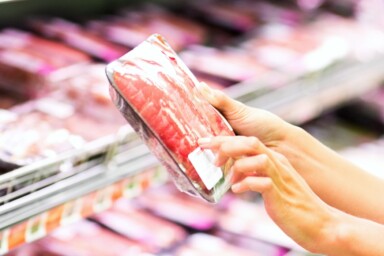Over the past month, Parliament has become obsessed with chlorine-washed chicken carcasses. Following the Summer Recess, the Agriculture Bill was up for debate, with Parliament pouring over the detail and raising the alarm on the impact that the legislation could have on food standards.
The public pressure to maintain food standards has been considerable. While many UK citizens couldn’t explain the differences between pharmaceutical standards from the US to the UK, most UK citizens could name chlorinated chicken, GM or hormone-treated beef as examples of food that is legal in the US. The emotive nature of the issue is why more than 1 million people signed a petition to ensure that future trade deals do not lead to a lowering of food standards.
However, while the focus has primarily been on the United States and the risk of cheap food flooding the UK market, there are significant risks to food safety and food standards posed by free trade agreements with other nations. September also saw another round of trade negotiations with Australia. Top of the list for the Australian negotiators is beef, of which approximately 40% is treated with growth hormones. Currently, hormone-treated beef is not allowed to be imported into the UK since a 2003 EU scientific review concluded that the hormone estradiol-17β was carcinogenic. Australia has long opposed the European Union’s position on hormone-treated beef and disputes the scientific analysis. Gaining access to the UK market is a key issue for the Australian side and Canberra hopes to take advantage of Brexit to increase its market share in the UK.
Other nations have also expressed interest in a free trade agreement with the UK that could impact our food standards. Brazil is keen to increase sales of soy to UK farmers, which could lead to the expansion of Brazilian production and further deforestation of the Amazon. A trade deal with Vietnam could see a glut of Vietnamese fish products entering the UK. These could undercut UK fisheries, that are already suffering, and have a serious public health impact since chemical standards in Vietnam are significantly lower. A 2016 shipment of Vietnamese catfish was found to have been treated with illegal carcinogenic chemicals and antibiotics, including gentian violet, malachite green and enrofloxacin, a fluoroquinolone that is closely related to the medical antibiotic Cipro. India is also keen to agree a trade deal with the UK. However, Indian spice imports have been under increased scrutiny because of contamination and additives. In 2014, unlabelled peanut protein was found in exported Indian cumin powder, which could prove life threatening for individuals with peanut allergies.
The first attempt to enshrine food standards into law was through the Agriculture Bill. The goal was to ensure that UK farmers were not undercut by cheap imports of foreign food flooding into the market and that public health is maintained. When it went through the House of Lords, a number of amendments were accepted by Peers, including Lord Curry’s which aimed to strengthen the Trade and Agriculture Commission that Liz Truss launched to appease farming groups over the summer. It was then up to MPs to decide whether to vote through the amendment, against the Government’s wishes.
The desire to improve the Commission is valid since the Commission is not fit for purpose. Firstly, it is only advisory and there is no requirement for the Government to even respond to its recommendations. Secondly, the Government has limited its lifespan to only six months, which is insufficient time to adequately assess import standards. Lastly, the membership is too narrow with a strong emphasis on large-scale, conventional farming and few representatives from the sustainable farming sector. The value in strengthening the Trade and Agriculture Commission so that it is fit for purpose, is that it could hold Government to account over future import standards. To achieve this, the Commission would need to have the authority to make recommendations to Government and a requirement to report to Parliament on each new trade agreement, prior to the agreement being signed. Secondly, the membership needs to be expanded to represent environmental, animal welfare and consumer groups.
However, despite considerable public pressure, attempts to reform and strengthen the Commission failed in the House of Commons. The Agriculture Bill passed through the House of Commons without any amendment to protect food standards being adopted. It will now return to the House of Lords, in a process known as ‘ping pong’. It will be up to Peers to decide whether to accept the version as it stands, or to reintroduce amendments that push for greater protection for food standards.
However, farming groups did not put all their eggs in the Agriculture Bill basket. They have also been lobbying hard to have food standards incorporated into the Trade Bill. The Trade Bill went through Second Reading in the House of Lords this month and has now reached Report Stage. There were a notable number of proposed amendments on standards – including Lord Grantchester’s amendment that would ensure that future free trade agreements are consistent with standards for food safety and quality – which have not succeeded.
The most important aspect within the Trade Bill is that it will set the terms by which all future trade deals are negotiated and agreed. Despite all the bluster, all the speeches and all the column inches, there is actually very little that Parliament can do. That is because UK law currently allows for very little Parliamentary scrutiny of trade deals. Neither the House of Lords nor the House of Commons has the ability to interrogate trade agreements negotiated by the Department of International Trade. In fact, unless changes are made, the UK’s future trade deals will receive less scrutiny than the trade deals it entered as part of the EU.
This is shameful. Citizens elect MPs to act in their interest, but those MPs would not be able to interrogate or challenge the terms of a future free trade deal. Essentially, that would mean that Department of International Trade could agree food standards of a new US/UK deal with their US counterparts, without any challenge from British legislators.
As Emily Jones, Associate Professor of Public Policy at the Blavatnik School of Government, Oxford University, says: ‘For scrutiny to be effective, Parliament needs access to much more information throughout negotiations and more time to scrutinise final agreements, and there are strong grounds for guaranteeing Parliament the opportunity to shape the negotiating mandate, and to debate and vote on treaties before they are ratified.’
The Sustainable Food Trust will continue to inform you about how these negotiations progress in Parliament and what you can do to help in the fight to protect our food standards.







